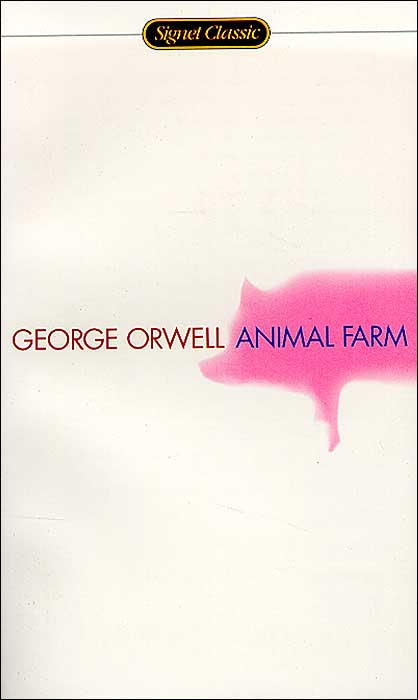I just read Animal Farm by George Orwell (1945). Little did I know, he subtitled his book “A Fairy Story,” which was a curious coincidence after reading The Tales of Beedle the Bard.
I decided that yes, this is a fariy-story, if a rather complicated and nearly outdated one.
Possible spoilers after the break…
I’m sorry to say that I found the introduction by C.M. Woodhouse more enlightening than Orwell’s work. Woodhouse examines the idea that Animal Farm is a fairy-story and comes to the conclusion that it is not the stuff of fairy-tales in the sense of the escapist, sleeping-princess happy-ending books we grew up with. Instead, in Animal Farm Orwell writes with the kind of balanced indifference that we forget to associate with fairy tales. The narrator in a fairy-story describes events with less bias than any newspaperman could ever hope to; he states the facts, good or ill, and steps aside so completely that the story must speak for itself. As Woodhouse puts it:
The point about fairy-stories is that they are written not merely without a moral but without a morality. They take place in a world beyond good and evil, where people (or animals) suffer or prosper for reasons unconnected with ethical merit…
They never seek to criticize or moralize, to protest or plead or persuade; and if they have an emotional impact on the reader, as the greatest of them do, that is not intrinsic to the stories. They would indeed only weaken that impact in direct proportion as soon as they set out to achieve it.
I couldn’t describe it before, but it is this characteristic that so caught my attention in Rowling’s fairy tales. Anyway…
With this in mind I read Animal Farm and found that it fits this description precisely (Indeed, I think much of Orwell’s work could be described in this manner, including my favorite work of his so far, Down and Out in Paris and London). Unfortunately, I don’t feel like I’m in any position for Animal Farm to have an emotional impact on me. Because fairy-stories are so ‘sterile,’ they depend heavily on the reader’s personal experience and previous knowledge to make their impact. My personal experience and knowledge of Socialist Russia is sorely lacking, so much so that I felt like I was missing explicit references all through the book. I don’t think I understand what point Orwell was trying to get across. In the preface, Russel Baker explains that Orwell was in favor of Socialism, just not as it was being executed in Russia. Yet the story is so anti-socialist that I don’t see how that can be.
The commandment rewritten at the end of the book, “All animals are equal but some animals are more equal than others,” seems to be the exact reason that Socialism on Animal Farm failed. It was the superior intelligence of the pigs – their innate superiority in a certain trait – that allowed them to take advantage of the situation. Surely Orwell is not suggesting they don’t deserve it – they fight hard to get to the top. But perhaps he is suggesting that Socialism merely reorganizes the social classes, rather than eliminating them. Still, this doesn’t seem like his argument either.
Maybe Orwell is telling us that Socialism with any kind of designated leader is doomed to this sort of failure. Right from the beginning of the story a social stratification is established that widens as the pages turn. Is that his message?
I get the feeling that, like a young child, I need my parent to sit down and explain what I’m supposed to learn from this fairy-story. Time to find the annotated copy.
